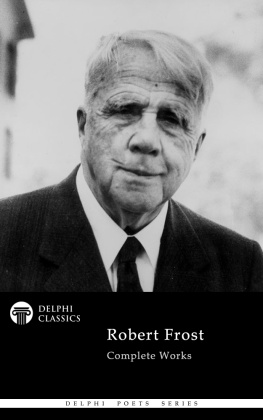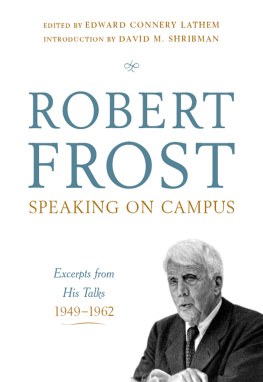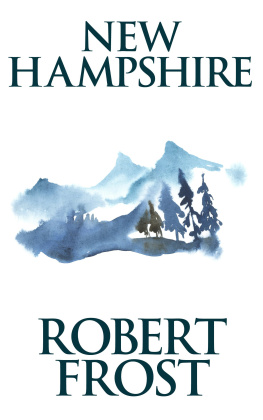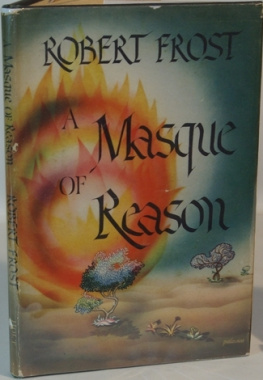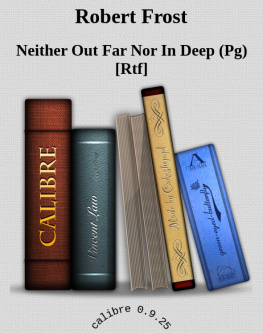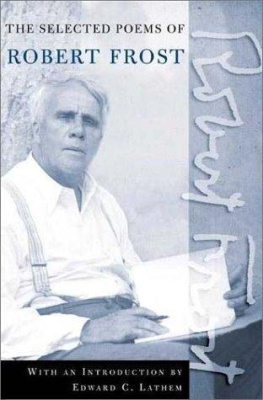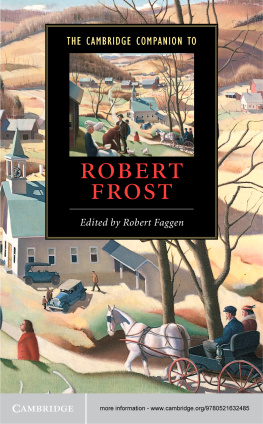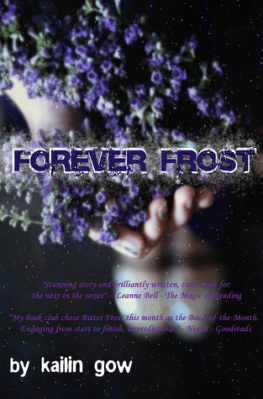

Robert Frost
(1874-1963)

Contents

Delphi Classics 2020
Version 1









Browse the entire series


Robert Frost

By Delphi Classics, 2020
COPYRIGHT
Robert Frost - Delphi Poets Series

First published in the United Kingdom in 2020 by Delphi Classics.
Delphi Classics, 2020.
All rights reserved. No part of this publication may be reproduced, stored in a retrieval system, or transmitted, in any form or by any means, without the prior permission in writing of the publisher, nor be otherwise circulated in any form other than that in which it is published.
ISBN: 9781786561077
Delphi Classics
is an imprint of
Delphi Publishing Ltd
Hastings, East Sussex
United Kingdom
Contact: sales@delphiclassics.com
www.delphiclassics.com
NOTE


W HEN READING POETRY on an eReader, it is advisable to use a small font size and landscape mode, which will allow the lines of poetry to display correctly.
The Poetry Collections

Late nineteenth century San Francisco Frosts birthplace. The house no longer stands.

A birds-eye view of San Francisco in 1874, the year Frost was born

A memorial plaque close to the site of Frosts birthplace

Frost in his late teens
Brief Introduction: Robert Frost

T HE AMERICAN POET Robert Frost was born in San Francisco, March 26, 1875. His father was a New England teacher and later became an editor of the San Francisco Evening Bulletin, later merging into the San Francisco Examiner. After his death on May 5, 1885, the family moved across the country to Lawrence, Massachusetts, under the patronage of William Frost, Sr., the poets grandfather, who was an overseer at a New England mill. Frosts mother, who was of Scottish descent, joined the Swedenborgian church and had her son baptised there, although he chose to leave it as an adult.
Although he is now famous for his portrayal of rural life in his poetry, Frost grew up in the city, where he published his first poem in his schools magazine, before graduating from Lawrence High School in 1892. After attending Dartmouth College for two months, Frost returned home to teach and to work at various jobs, including delivering newspapers and working in a factory as an arclight carbon filament changer, as well as aiding his mother in teaching her own class of unruly boys. Nevertheless, he did not enjoy these jobs, feeling his true calling was literature.
In 1894 Frost sold his first poem, My Butterfly. An Elegy , which was published in the November 8, 1894, edition of the New York Independent for $15, an impressive amount at that time. Proud of his accomplishment, he proposed marriage to Elinor Miriam White, his classmate and co-valedictorian at Lawrence High School, though she refused, wishing to finish her university education before they married. Frost then went on an excursion to the Great Dismal Swamp in Virginia and asked Elinor again upon his return. Having graduated, she agreed and they were married at Lawrence, Massachusetts on December 19, 1895.
Frost attended Harvard University from 1897 to 1899, but he had to leave due to illness and halfway through the spring semester of his second year, Dean Briggs released him without prejudice, lamenting the loss of so good a student. Shortly before his death, Frosts grandfather William purchased a farm for him and Elinor in Derry, New Hampshire, where the poet worked for nine years, while writing early in the mornings and producing many of the poems that would later become famous. However, his farming proved unsuccessful and he returned to education as an English teacher at New Hampshires Pinkerton Academy from 1906 to 1911, before joining the New Hampshire Normal School in Plymouth, New Hampshire.
In 1912 Frost sailed with his family to Great Britain, settling first in Beaconsfield, a small town outside London. A Boys Will , his first book of poetry, was published the following year. In England he made some important acquaintances, including the critic and aspiring poet, Edward Thomas, a member of the group known as the Dymock Poets, T.E. Hulme and Ezra Pound. Although Pound would become the first American to write a favourable review of Frosts work, the latter would later resent Pounds attempts to manipulate his American prosody.
As World War I began, Frost returned to America in 1915 and bought a farm in Franconia, New Hampshire, where he launched a determined career in writing, teaching and lecturing. This family homestead served as the Frosts summer home until 1938 and it is now maintained as The Frost Place, a museum and poetry conference site. Over intervals from 1916 to 1938, Frost taught English at Amherst College in Massachusetts, notably encouraging his students to account for the many diverse sounds and intonations of the spoken English language in their writing. He called his colloquial approach to language the sound of sense, which he also applied to many of his verses at this time. Success soon followed and in 1924, after the publication of New Hampshire: A Poem with Notes and Grace Notes , he won the first of what would later be several Pulitzer Prizes.
Next page
